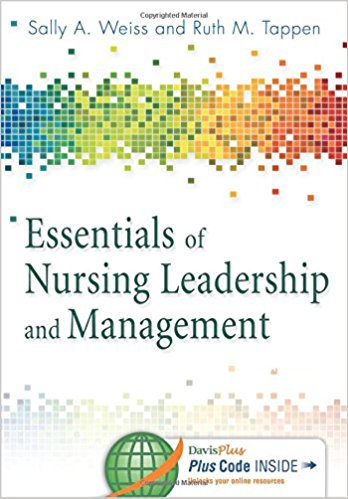In Stock
Whitehead Essentials of Nursing Leadership & Management ,6th Edition by Sally A. Weiss, Ruth M. Tappen Test Bank
The Whitehead Essentials of Nursing Leadership & Management, 6th Edition by Sally A. Weiss and Ruth M. Tappen provides a comprehensive overview of essential leadership and management skills in nursing. This updated edition covers key concepts, strategies, and real-world applications to help nurses develop effective leadership abilities and manage healthcare teams efficiently. Buy this valuable resource to enhance your leadership skills and advance your nursing career with practical insights and expert guidance.
Original price was: $55.00.$19.00Current price is: $19.00.
Whitehead Essentials of Nursing Leadership & Management,6th Edition by Sally A. Weiss, Ruth M. Tappen Test Bank
Chapter 1: Leadership and Followership
MULTIPLE CHOICE
1. The essence of leadership is the leader’s ability to:
A. Get people to work together.
B. Impress other people.
C. Help others meet their personal goals.
D. Influence the group to follow the leader’s way of thinking.
ANS: A
Chapter 1: Leadership and Followership
2. According to “trait theories,” the most common traits of a good leader are:
A. Information giving and decision-making.
B. Public speaking and nonrisk behaviors.
C. Intelligence and initiative.
D. Verbal and written communication skills.
ANS: C
Chapter 1: Leadership and Followership
3. Of the following qualities, which would least likely be attributed to an effective nursing leader?
A. Energy and integrity
B. Pessimism and stress
C. Courage and initiative
D. Optimism and perseverance
ANS: B
Chapter 1: Leadership and Followership
4. Behaviors of an effective leader include:
A. Obstructing the exchange of information.
B. Being unable to communicate effectively.
C. Giving only negative feedback.
D. Developing oneself and others.
ANS: D
Chapter 1: Leadership and Followership
5. Sally has been working only 3 months after graduating from her nursing program. She confides in a friend that she wants to develop herself as a “good follower.” Her friend says, “Anyone can follow—just walk behind someone and do nothing.” How might Sally respond?
A. “I don’t mean now, but when I become a nurse manager.”
B. “Effective followers need to be active participants in the workings of this unit.”
C. “Effective followers need to do everything the administrators want.”
D. “Effective followers need to continuously question the status quo and strive to make changes.”
ANS: B
Chapter 1: Leadership and Followership
6. James has demonstrated strong leadership skills during his first year as an RN. He observes that one of his coworkers appears very anxious when dealing with demanding families. James displays emotional intelligence when he:
A. Reports to the nurse manager that his friend is very anxious when dealing with demanding families.
B. Says to his friend, “Dealing with these demanding families can be stressful.”
C. Says to his friend, “You seem very anxious when dealing with these families; maybe you should seek counseling.”
D. Ignores the behavior because everyone takes a different time to adjust to the role of an RN.
ANS: B
Chapter 1: Leadership and Followership
7. Linda believes she should begin demonstrating leadership skills on her unit. She speaks with her nurse manager about how to do this. The nurse manager, who wants to encourage Linda’s leadership development, responds by saying:
A. “Just watch me closely—it will come to you eventually.”
B. “Develop perseverance—just hang in there and do your work well. Someone higher than me will notice you.”
C. “It takes a lot of energy to be a leader. You might want to sign up at the local gym.”
D. “Understand yourself first—what leadership skills do you want to develop?”
ANS: D
Chapter 1: Leadership and Followership
8. Which skills will not be useful in becoming a better follower?
A. Supporting the ideas of your colleagues
B. Becoming an effective listener
C. Demonstrating energy and enthusiasm in the workplace
D. Contradicting others if their ideas are not useful to the team
ANS: D
Chapter 1: Leadership and Followership
9. Nancy is supervising a patient care assistant and a licensed practical nurse. When giving them assignments she says, “You two decide how you want to divide up the patients.” This is an example of what type of leadership?
A. Autocratic
B. Laissez-faire
C. Democratic
D. Situational
ANS: B
Chapter 1: Leadership and Followership
10. Emotional intelligence is an important part of leadership. Which of these qualities is not part of emotional intelligence?
A. Understanding self
B. Listening skills
C. Acknowledging others
D. Responding quickly to a crisis
ANS: D
Chapter 1: Leadership and Followership

Reviews
There are no reviews yet.